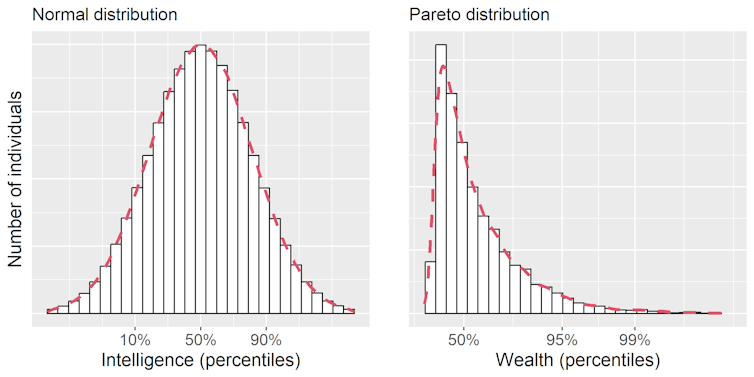From “White Lotus'' to “Succession,'' TV dramas about the super-wealthy are in high demand. The characters in these shows are usually portrayed as entitled, empty, and sad. However, they are not necessarily portrayed as unintelligent. So, are rich people rich because they are smart?
In the midst of a cost-of-living crisis, this question goes beyond scientific curiosity and touches on something deeper.
If people's net worth were simply the result of their intelligence, the huge wealth disparities seen in our society might be perceived as less intolerable, at least for some people. not. Inequality will be the price the smartest people pay to lead us all to a better future.
There is little doubt that intelligence contributes to financial and professional success. Take self-made billionaires Elon Musk, Jeff Bezos, and Ray Dalio, just to name a few. It would be surprising if top innovators in cutting-edge fields like technology and finance were average.
In fact, intelligence is the best predictor of both academic achievement and job performance. And academic and occupational success are pretty good predictors of income. But that's not all.
Not all highly intelligent people are primarily driven by a desire for wealth. They often have a thirst for knowledge. Instead, some may choose intellectually challenging, relatively low-paying jobs such as architecture, engineering, or research. A recent Swedish study showed that the cognitive test scores of the top 1% of earners were not significantly different from those obtained by people with slightly lower incomes.

Courtesy of Fabio Lovino/HBO.
But how much does intelligence increase wealth? Before we get into the evidence, we need to clarify what researchers mean by the term “intelligence.” Intelligence can be defined as the ability to successfully perform a wide range of cognitive tests. And they appear to be linked. People who are good at solving certain cognitive tests will likely perform well on other cognitive tests as well.
However, intelligence is not a monolithic trait. In fact, it consists of at least two broad components: fluid intelligence and crystallized intelligence. Fluid intelligence leverages core cognitive mechanisms such as speed of processing stimuli, memory capacity, and abstract reasoning. Conversely, crystallized intelligence refers to skills developed in a social environment, such as literacy, numeracy, and knowledge about specific topics.
This distinction is important because these two types of intelligence develop in different ways. Fluid intelligence can be inherited, cannot be increased, and declines fairly quickly with age. In contrast, crystallized intelligence increases throughout most of adulthood and begins to decline after about age 65.
But fluid intelligence helps build crystallized intelligence. Fluid intelligence refers to the brain's ability to acquire and elaborate information. Crystallized intelligence is largely acquired information.
This means that if your reasoning skills are sharp, you can process new information quickly. Accurately integrate new and old information. Ultimately, this speeds up learning in all areas and contributes to academic and financial success.
Education is also a factor
However, it is not just innate ability that is important. Another important factor is education.
Quantitative reviews have proven that the more years of schooling, the higher the intelligence scores of students. Importantly, these gains come from training in specific skills rather than improving general intellectual ability. That's why schools teach things that help both professional success and intelligence testing.
Naturally, education is influenced by a family's socio-economic status. For example, expensive schools and private tutors provide highly efficient tutoring to students. Therefore, having access to the highest quality education can make a big difference in your future income.
Of course, the influence of family socio-economic status on wealth is not influenced solely through education. Inheritance and networks are among her most obvious mechanisms. This is especially true for entrepreneurs, for whom investment potential and connections are the basis of business success.
role of luck
In other words, intelligence, education, and socio-economic status all influence income. However, these factors alone cannot fully explain individual differences in wealth. In fact, recent research suggests that luck plays a big role.
This study highlights that the statistical distribution of wealth is different from the distribution of intelligence. Intelligence is “normally distributed” and most people are about average. In contrast, wealth follows a “Pareto distribution.” This is a formula that shows that 80% of the country's wealth is in the hands of only 20% of the population.
distribution of intelligence and wealth

Author provided
This means that intelligence alone cannot explain the disproportionate gap between rich and poor in our society.
This study does not discount the role of intelligence (or talent in general). Great intellectual ability increases your chances of becoming rich. Nevertheless, there is no guarantee that intelligence will make you rich. Moreover, it is clear that a series of lucky events can turn an unremarkable person into a high-income earner.
In other words, intelligence is neither sufficient nor necessary to become rich. But it helps.
“I'd rather be lucky than lucky,'' says Chris Wilton (Jonathan Rhys Meyers), a character in Woody Allen's “Match Point.'' In light of the evidence we have just considered, he may be right.
Being born into a wealthy and well-educated family is a fortunate event. Similarly, random luck (such as winning the lottery) does not come from years of hard work. We might even take the argument a little further and conclude that being intelligent is itself a form of luck.
Many things that contribute to achieving financial success are beyond our control. Most, if not all, very wealthy people have been blessed by Lady Luck in some way.
On the contrary, it is certainly important to make the most of what luck has to offer. Indeed, many are simply cashing in on the benefits of inherited privilege.
In any case, many great and small fortunes are created by making wise use of the intellectual, educational, socio-economic, and other resources that we are fortunate to have.

